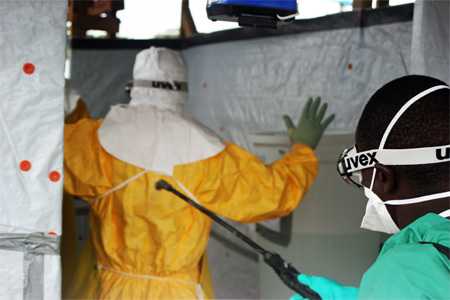Preparing Healthcare Workers to Work in Ebola Treatment Units (ETUs) in Africa
Overview of the training course
Ebola Training Toolkit

The Ebola training toolkit is for organizations (such as non-governmental organizations [NGOs]) to use to offer training to healthcare workers (HCWs) preparing to work in ETUs in Africa in response to the Ebola epidemic.
As part of a comprehensive and coordinated response to the 2014 Ebola epidemic in West Africa, CDC provided a 3-day experiential training course for over 600 healthcare workers (HCWs) (nurses, physicians and other healthcare providers) intending to work in an Ebola Treatment Unit (ETU) in Africa. The Preparing Healthcare Workers to Work in Ebola Treatment Units (ETUs) in Africa course was held at the U.S. Federal Emergency Management Agency (FEMA) Center for Domestic Preparedness (CDP) in Anniston, Alabama, The goals of this course were to:
- Provide information on the epidemiology and transmission of Ebola virus disease (EVD) and the current Ebola epidemic.
- Describe infection prevention and control principles as they pertain to working in ETUs in Africa.
- Demonstrate the skills needed to work safely and efficiently in a well-designed ETU.
- Describe how to evaluate personal and environmental safety within an ETU environment.
- Describe the basic principles of clinical care and management of the patient with EVD.
- Describe patient and community assessment and intervention strategies for Ebola treatment and control.
The CDC course contained information from similar courses developed by Médecins Sans Frontières (MSF) and the World Health Organization (WHO) and was primarily designed to provide training for persons intending to deploy urgently in response to the Ebola epidemic.
If you attended the CDC course and would like to receive Continuing Education credit, please see: https://www.cdc.gov/vhf/ebola/hcp/safety-training-course/continuing-education.html.
The CDC course is no longer offered, however CDC has developed an Ebola training toolkit designed to help organizations replicate CDC’s 3-day in-person training course to help prepare HCWs to work in ETUs in Africa.
The toolkit is a complete guide with training materials, templates, and videos to help offer a course that:
- Teaches HCWs principles of infection prevention and control to work safely in an ETU setting
- Uses blended learning methods, including:
- Lectures focused on Ebola transmission, epidemiology, and infection prevention and control
- Tabletop exercises providing opportunities for students to discuss lecture content and how to apply it in ETUs
- Hands-on interactive exercises in a mock ETU where students:
- Apply the concepts they learned in the lectures and discussed in tabletop exercises
- Practice donning and doffing personal protective equipment (PPE)
- Perform simulated patient care activities while wearing PPE
To access the toolkit, please visit: https://www.cdc.gov/vhf/ebola/hcp/safety-training-course/training-toolkit.html
- Page last reviewed: August 17, 2015
- Page last updated: August 17, 2015
- Content source:


 ShareCompartir
ShareCompartir
